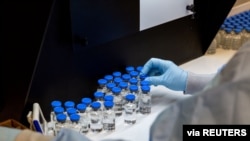The World Health Organization says the antiviral drug remdesivir is not beneficial and should not be used in treating patients hospitalized with COVID-19.
A WHO panel of international experts who reviewed the results of clinical trials have concluded there currently is no evidence that remdesivir improves survival of COVID-19 patients, no matter how severely ill they are.
Janet Diaz, head of Clinical Care at the World Health Organization, says the panel conditionally recommends against the use of remdesivir in hospitalized COVID-19 patients regardless of the severity of their illness. The panel says the evidence shows the drug has possibly no effect on mortality.
“Now, this does not prove that remdesivir does not have a benefit at all. That is why it is a conditional recommendation. There can still be potential small benefit maybe in a health sub-group, which is why the panel also recommended continued trials, continued enrollment into clinical trials,” Diaz said.
She suggested it might perhaps be better to focus on sub-groups, such as severe patients versus critical patients in future clinical trials.
The WHO panel’s recommendation is based on new evidence, which compared the effects of several drug treatments for COVID-19. It includes data from four international randomized trials involving more than 7,000 patients hospitalized for COVID-19.
Bram Rochwerg, a practicing ICU doctor in Hamilton, Ontario, Canada, and co-chair of the WHO panel, told VOA there is still ongoing uncertainty about the impact of remdesivir on survivability and mortality.
“We are not saying that there is evidence that remdesivir does not work but there is not good evidence that it does work. And there is not good evidence that harm is off the table. And so, it was these considerations that the panel looked at and they felt that the majority of people would not ascribe to a new therapy when the benefit was not there and that there was still a potential for worsening outcome and … leading to increasing death,” said Rockwerg.
At the same time, the WHO panel noted alternative treatments exist that are cheap and widely available, such as corticosteroid dexamethasone, which have been shown to reduce death among severely ill COVID-19 patients.
WHO Advises Against Use of Remdesivir on COVID Patients
- By Lisa Schlein




